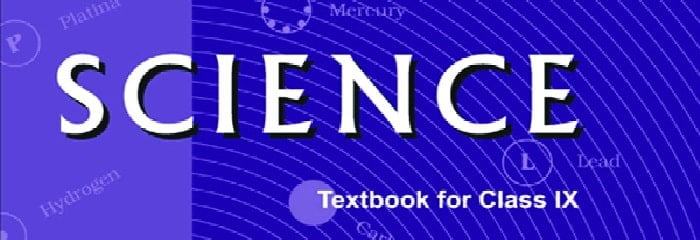About SCIENCE Class 9 CBSE Curriculum
☞ The subject of Science plays an important role, in developing well-defined abilities in cognitive, affective and in addition to it psychomotor domains in children. In another words science play very important role in overall development of a child. It augments the spirit of enquiry, creativity, objectivity and aesthetic sensibility.
Therefore, the upper primary stage demands that a number of opportunities should be provided to the students to engage them with the processes of Science for example observing, recording observations, drawing, tabulation, plotting graphs, etc., whereas the secondary stage also expects abstraction and quantitative reasoning to occupy a more central place in the teaching and learning of Science. Thus, the idea of atoms and molecules being the building blocks of matter makes its appearance, as does Newton’s law of gravitation.
Table of Contents
SCIENCE Class 9 CBSE Course Structure
Here is the Course Structure of SCIENCE Class 9 CBSE Annual Examinations.
| Unit No. | Unit | Marks |
|---|---|---|
| I | Matter – Its Nature and Behaviour | 25 |
| II | Organization in the Living World | 22 |
| III | Motion, Force and Work | 27 |
| IV | Food; Food Production | 06 |
| Total | 80 | |
| Internal assessment | 20 | |
| Grand Total | 100 |

NCERT text-book Contents
| Chapter | Class Notes 👇 🖱️ | NCERT SOLUTIONS | NCERT in-text Solutions | QUIZ / QUESTIONS |
|---|---|---|---|---|
| 1 | MATTER IN OUR SURROUNDINGS | NCERT Solutions Chapter 02 | NCERT in-text Solutions Chapter 01 | |
| 2 | IS MATTER AROUND US PURE? | NCERT Solutions Chapter 02 | NCERT in-text Solutions Chapter 02 | |
| 3 | ATOMS AND MOLECULES | NCERT Solutions Chapter 03 | NCERT in-text Solutions Chapter 03 | |
| 4 | STRUCTURE OF THE ATOM | NCERT Solutions Chapter 04 | NCERT in-text Solutions Chapter 04 | |
| 5 | THE FUNDAMENTAL UNIT OF LIFE | NCERT Solutions Chapter 05 | NCERT in-text Solutions Chapter 05 | |
| 6 | TISSUES | |||
| 7 | DIVERSITY IN LIVING ORGANISMS | |||
| 8 | MOTION | NCERT Solutions Chapter 8 | NCERT in-text Solutions Chapter 8 | QUIZ-1 Quiz-2 |
| 9 | FORCE AND LAWS OF MOTION | QUIZ-1 | ||
| 10 | GRAVITATION | NCERT Solutions 10 | Quiz-1 | |
| 11 | WORK AND ENERGY | NCERT Solutions Chapter 11 | NCERT in-text Solutions Chapter 11 | |
| 12 | SOUND | |||
| 13 | WHY DO WE FALL ILL? | NCERT Solution Chapter 13 | NCERT in-text Solutions Chapter 13 | |
| 14 | NATURAL RESOURCES | |||
| 15 | IMPROVEMENT IN FOOD RESOURCES |
SCIENCE Class 9 CBSE Syllabus:
Theme: Materials
Unit I: Matter-Nature and Behaviour
Definition of matter; solid, liquid and gas; characteristics – shape, volume, density; change of state- melting (absorption of heat), freezing, evaporation (cooling by evaporation), condensation, sublimation.
Nature of matter: Elements, compounds and mixtures. Heterogeneous and homogenous mixtures, colloids and suspensions. Physical and chemical changes (excluding separating the components of a mixture).
Particle nature and their basic units: Atoms and molecules, Law of Chemical Combination, Chemical formula of common compounds, Atomic and molecular masses.
Structure of atoms: Electrons, protons and neutrons, Valency, Atomic Number and Mass Number, Isotopes and Isobars.
Theme: The World of the Living
Unit II: Organization in the Living World
Cell – Basic Unit of life : Cell as a basic unit of life; prokaryotic and eukaryotic cells, multicellular organisms; cell membrane and cell wall, cell organelles and cell inclusions; chloroplast, mitochondria, vacuoles, endoplasmic reticulum, Golgi apparatus; nucleus, chromosomes – basic structure, number.
Tissues, Organs, Organ System, Organism: Structure and functions of animal and plant tissues (only four types of tissues in animals; Meristematic and Permanent tissues in plants).
Theme: Moving Things, People and Ideas
Unit III: Motion, Force and Work
Motion: Distance and displacement, velocity; uniform and non-uniform motion along a straight line; acceleration, distance-time and velocity-time graphs for uniform motion and uniformly accelerated motion, elementary idea of uniform circular motion.
Force and Newton’s laws : Force and Motion, Newton’s Laws of Motion Action and Reaction forces, Inertia of a body, Inertia and mass, Momentum, Force and Acceleration.
Gravitation: Gravitation; Universal Law of Gravitation, Force of Gravitation of the earth (gravity), Acceleration due to Gravity; Mass and Weight; Free fall.
Floatation: Thrust and Pressure. Archimedes’ Principle; Buoyancy.
Work, Energy and Power: Work done by a Force, Energy, power; Kinetic and Potential energy; Law of conservation of energy (excluding commercial unit of Energy).
Sound: Nature of sound and its propagation in various media, speed of sound, range of hearing in humans; ultrasound; reflection of sound; echo.
Theme: Food
Unit IV: Food Production
Plant and animal breeding and selection for quality improvement and management; Use of fertilizers and manures; Protection from pests and diseases; Organic farming
NCERT Book Class 9th SCIENCE. Click here to get pdf ☞ SCIENCE BOOK
MY YouTube Channel Link : 👉🖱 https://www.youtube.com/channel/UCGpC7nWE0-bBv9I53MM8qjQ